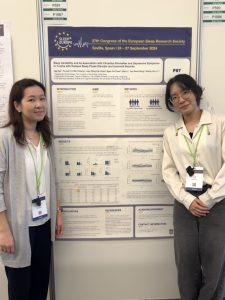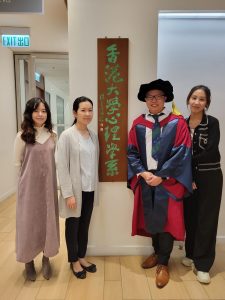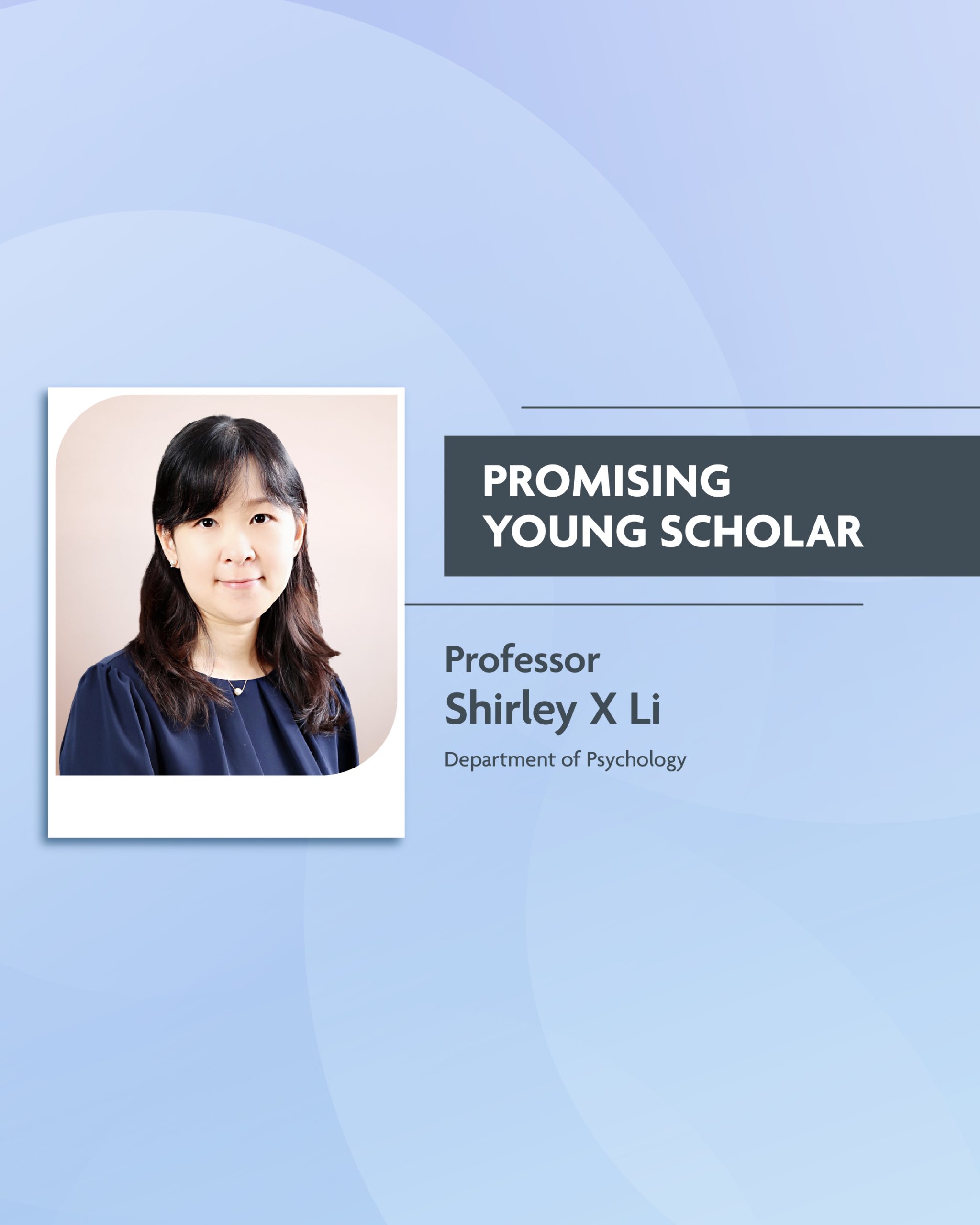Unlocking the Secrets of Sleep: How Professor Shirley Li Is Transforming Our Understanding and Improving Health
A lack of good sleep can lead to devastating health problems, yet many people neglect the quality of their rest. Professor Shirley Li works to help people sleep better and raise awareness about the importance of sleep.



Clinical Psychologist Professor Shirley Xin Li specialises in research into sleep. She has won a slew of accolades for her work. These include the Elio Lugaresi WASM Award for Sleep Medicine from the World Association of Sleep Medicine in 2009; the Young Investigator Award at the World Congress in Sleep Medicine in 2013, and again in 2015, and the Outstanding Early Investigator Award (Honorable Mention) from the Sleep Research Society in 2017. Internally, Professor Li won the HKU Outstanding Young Research Award in 2022. More recently, she has been conferred the Belinda Hung Outstanding Young Professorship for three years starting from 2025.
“I’m very honoured to receive this recognition,” she says. “I’m grateful for the University’s recognition of my work.”
She received her Honours BSc in Psychology at the University of Toronto and obtained her PhD in Medical Sciences (Psychiatry) from The Chinese University of Hong Kong, followed by a Doctorate in Clinical Psychology (DClinPsy) from University College London. She is a registered Clinical Psychologist in Hong Kong and the United Kingdom.
Despite her success as a clinical psychologist, it was not the field she first planned to specialise in.
“At the beginning, my major was in biochemistry and I was planning to take psychology as my elective,” she says. “But then I realised it was so fascinating and I decided to switch to psychology as my major. I was really interested in understanding the human mind and behaviour.”
The Impact of Poor Sleep
Professor Li’s research focuses on how sleep affects physical and mental health. “If your sleep is disrupted, it may affect your cognitive abilities – for example, your executive function, or compromise problem-solving or emotional regulation abilities,” she explains. “If you’re feeling grumpy or having difficulty concentrating, it may well be due to a lack of good sleep the night before.”
The study of sleep has come under the spotlight recently following new research showing its links to neurodegenerative disorders such as Alzheimer’s. Disrupted sleep has also been linked to depression and other mental health problems including anxiety, psychosis and even suicide.
“The research has been consistently showing this reciprocal link between sleep disruption and mental health problems,” Professor Li says. “For example, individuals with mental health problems often report difficulty sleeping, whilst some research has also shown that sleep disturbance is a risk factor for developing psychological problems, such as anxiety and depression, and could increase the risk for suicidal behaviours. There’s research showing that disrupted sleep affects one’s ability to regulate emotions and impulsivity thereby increasing the risk for mental health problems.”
Clearly, it’s a mistake to ignore sleep disturbances.
“Asian people, especially people in Hong Kong, often don’t prioritise their sleep,” she says. “As a sleep researcher, we definitely need to advocate the importance of sleep to the public.”
Finding Ways to Improve Sleep
The good news is that poor sleep can be improved, and the conditions it affects also have the potential to be improved.
One area Professor Li has been working on recently – and one that brings her the most satisfaction – is finding ways to help young people improve their sleep. Adolescents experience multiple challenges and changes that can increase their vulnerability to sleep and mental health problems, which inspired her to see how she could help.
Adolescents also have particular sleep patterns, she explains.
“They have an intrinsic delay in their biological clock, so they tend to go to bed later and also get up later.”
Adolescents in Hong Kong and other parts of Asia share cultural characteristics that may make them more prone to sleep problems.
”For example, we know Asian school age children and adolescents are more sleep deprived compared to their Caucasian counterparts,” she says. “We know our Asian kids are more academically oriented. They tend to compromise their sleep in order to have more time for study or other extracurricular activities. However, research consistently highlights that insufficient sleep can have detrimental effects on overall health, particularly on the physical and cognitive development of young people.”
Finding the right ways of connecting with teenagers is important. Professor Li and her team have been experimenting with app-based interventions, which also help to lessen the workload pressure on Hong Kong’s limited number of therapy providers.
Adolescents are not the only ones susceptible to sleep problems. Professor Li also notes the high prevalence of sleep problems among the elderly and among pregnant women, which she learnt through first-hand experience. She is now developing research in this area.
“The reason I started to become interested in the area of perinatal sleep and mental health is because when I was pregnant and after giving birth, my sleep was really bad and affected my daytime functioning, and I realised how important sleep is to the parents, especially mums,” she says. “I have three kids so for a long period I was sleep-deprived.”
Tips to Improve Your Sleep
Insomnia – difficulty in falling asleep or staying asleep – is a common sleep problem. Professor Li recommends developing consistent bedtime and rising times to let your brain stabilise your biological clock.
If you don’t feel sleepy, don’t go to bed until you are. Otherwise, you may feel anxious about not sleeping, which in turn makes sleep less likely. A relaxing wind-down routine can be helpful.
While people’s sensitivity to light differs and some people can still fall asleep with their device on, Professor Li advises switching it off at least an hour before you plan to sleep.
“Prolonged light exposure can suppress the secretion of melatonin, which is a sleep-related hormone, so that you don’t feel sleepy,” she explains. “The other reason is that when you’re engaging with your electronic device, your brain is actually quite active and if your brain is still aroused, it’s very difficult to shut down.”
While short naps can help improve cognitive functioning in the afternoon, she advises against them for people suffering from chronic insomnia.
“With chronic insomnia, we advise the person to avoid taking naps because we want them to have more consolidating sleep at night, instead of using the quota for sleep during the day.”



Professor Shirley Xin Li has been conferred the Belinda Hung Outstanding Young Professorship for a term of three years starting from January 2025, to be held concurrently with her appointment as Associate Professor in the Department of Psychology. The “Outstanding Young Professorships Scheme” represents the University’s commitment to nurturing rising stars and young talents. The Professorship may be perpetually named in honour of a donor, corporation or other honouree(s) as recommended by the donor.
Contributing writer: Liana Cafolla
